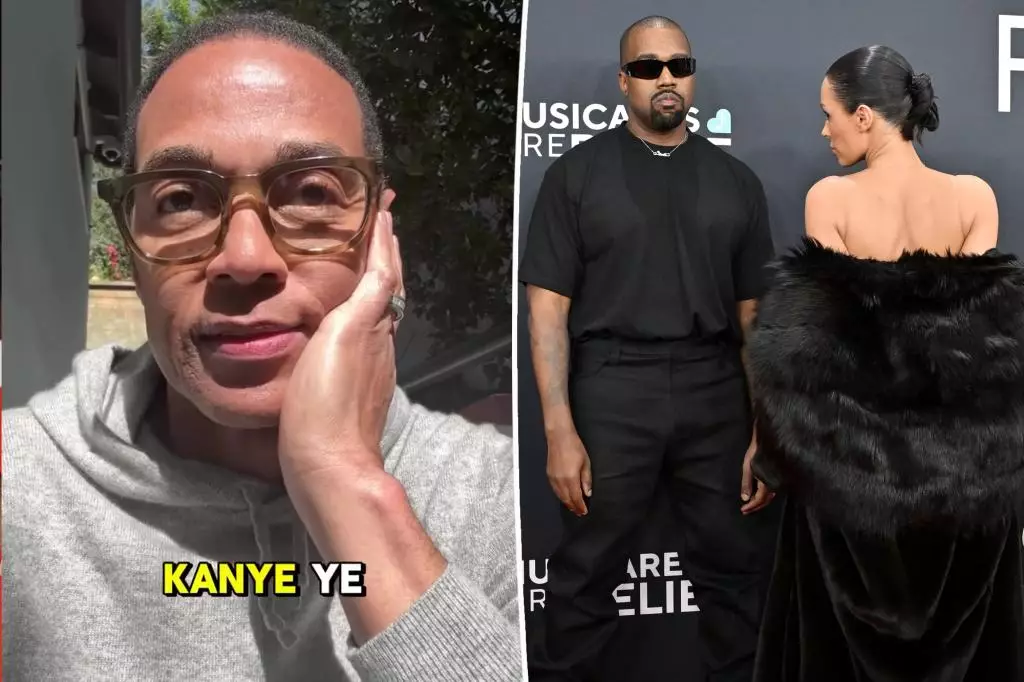In a dramatic turn of events reminiscent of the ongoing cultural friction that permeates celebrity interactions today, news anchor Don Lemon recently found himself at odds with rapper Kanye West. The discord arose when West labeled Lemon a “koon” – a derogatory term with deep historical implications within the Black community – after the CNN alum allegedly spread rumors concerning his and Bianca Censori’s removal from the Grammy Awards. This confrontation not only highlights the strained relationship between two high-profile figures but also serves as a reflection on issues of respect, accountability, and the implications of social media in public discourse.
The incident escalated at the 14th Annual NFL Honors in New Orleans, where Lemon expressed his surprise at West’s reaction. Sharing his feelings with Page Six, Lemon stated, “C’mon man, we’re both black men. You know what that word means in our community. Have some respect.” This comment underscores the significant weight such terms carry, illustrating Lemon’s view that West, as a fellow Black man, should understand the implications better. The social and cultural context of their exchange is paramount; both individuals are part of a larger narrative dealing with race, media representation, and the public’s perception of Black figures in high-profile positions.
The root of the controversy lies in Lemon’s dissemination of claims regarding West and Censori being ejected from the Grammys. However, Lemon claimed he was merely passing on information he had come across, and he did not witness the incident firsthand. As the dust settled, Lemon’s assertion drew attention to the delicate nature of reporting in the age of social media, where the line between rumor and fact can become blurred in an instant. The quickness with which misinformation can spread, amplified by platforms like Instagram, complicates the responsibility of public figures as they navigate both their personal brand and their interactions with each other.
Lemon’s comments on West’s marketing prowess add another layer to the discussion. Describing West as a “master marketer” who is capable of orchestrating eye-catching publicity stunts, Lemon articulated a dual admiration and criticism of West’s behavior surrounding his controversial red carpet appearance. This raises questions about the intentions behind such provocations – are they genuine artistic expressions, or calculated moves to ensure media coverage? Whether West intended to draw attention or recreate imagery from his own artistic endeavors, it becomes evident that his actions are often intertwined with broader discussions of celebrity culture and artistry.
In the aftermath of the Instagram debacle, Lemon took to social media to clarify his role, urging West to “get your s**t straight.” The seriousness with which he addressed West’s allegations underscores the importance of accountability in public interaction. Lemon’s vehement defense echoed a sentiment of disillusionment that resonates within many communities – the need for respect in discourse, particularly when addressing issues that affect marginalized groups. Lemon further criticized West by referencing his past political affiliations with former President Trump, a statement that adds a layer of political tension to their personal feud.
The exchange between Lemon and West serves as a microcosm of larger societal issues, highlighting the fragile nature of public respect, racial discourse, and media responsibility. As both men navigate their respective roles – Lemon as a journalist and West as an influencer – the incident illustrates the potential for misunderstanding and the rapid dissemination of misinformation in the digital age. Their confrontation reduces down to essential questions about how public figures relay information, the respect owed to one another, and the power dynamics that influence their interactions.
The public feud between Don Lemon and Kanye West reveals not only personal grievances and miscommunications but also reflects a deeper societal narrative about respect and responsibility within the African American community. As the world watches, this ongoing dialogue may well shape how both men are perceived, not just by their peers but also by the audiences they engage with across various platforms.


Leave a Reply